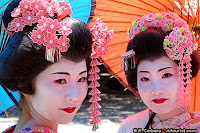I already wrote a piece on Cloud Computing here so I'm not going to replicate my musings as I've nothing new to add.
Of all the recent online applications available Google Maps and Skype are my favourites. Funnily enough they are both ways of connecting person and place. My sister in law from Australia visited recently. Using Google Maps she honed in on her hometown of Mornington outside Melbourne. She took me to her parents house, then we went down the street and saw where my sister and nieces are living and then treked down to the beach. It was the closest thing I will get to visiting them for some time, but it was wonderful to see what it was like, and get a feel for the proximity of their lives to one another.
Here's where I'd like to be right now:
 |
| Kyoto, Japan |
I became fascinated with Japanese history and culture in my teens. Their literature challenged my imagination as I struggled to visualise these exotic lands and grasp their culture, so alien was it from my sheltered parochial teenage life.
 I was in awe of the Geisha, their beauty, their sadness, their broken hearts and unfulfilled, cruel lives. I was terrified of the emperors and the Samurai, they seemed to have all the power and control but seemingly soft hearted and compassionate underneath.
I was in awe of the Geisha, their beauty, their sadness, their broken hearts and unfulfilled, cruel lives. I was terrified of the emperors and the Samurai, they seemed to have all the power and control but seemingly soft hearted and compassionate underneath.
 I was in awe of the Geisha, their beauty, their sadness, their broken hearts and unfulfilled, cruel lives. I was terrified of the emperors and the Samurai, they seemed to have all the power and control but seemingly soft hearted and compassionate underneath.
I was in awe of the Geisha, their beauty, their sadness, their broken hearts and unfulfilled, cruel lives. I was terrified of the emperors and the Samurai, they seemed to have all the power and control but seemingly soft hearted and compassionate underneath.Though it's thoroughly modern capital Tokyo, is thronged with businessmen and Harajuku girls shuttled on the Shinkansen bullett to neon light karaoke bars, nintendo arcades and hightech business conferences, much of Japans founding culture can still be witnessed in the tranquil settings of Kyoto.
Traditionally clad girls immerse themselves in Ikenobo flower arranging, tourists visit the machiya townhouses, golden Pavilion, and shinto shrines maybe even taking in a perfromance from the maiko girls. It really is a country of contrasting cultures and fortunes.
There is something serenely beautiful about Japanese art and music, despite their tumultuous past, they always act poised and composed, even their prostitutes are elegant ladylike dolls, who sit demurely playing traditional music. A stark cry from their modern counterparts, preoccupied with tacky garish pop culture and a crassly consumerist society. Yet beneath all that they still strive for perfection and brilliance in all that they setout to achieve.
Ahhh some day I will visit ...............I can but dream................
There is something serenely beautiful about Japanese art and music, despite their tumultuous past, they always act poised and composed, even their prostitutes are elegant ladylike dolls, who sit demurely playing traditional music. A stark cry from their modern counterparts, preoccupied with tacky garish pop culture and a crassly consumerist society. Yet beneath all that they still strive for perfection and brilliance in all that they setout to achieve.
Ahhh some day I will visit ...............I can but dream................
Google Docs is an extension of the concept of wikis, in that instead of attaching and sending documents you can save a document online and let people read it there. Less duplication and less error.
You don't need to worry about attaching different versions of the same document to different people or having to re-send once you make a change, they will access the latest version online. Similar to cloud computing you're not clogging up your hard drive you're using web allocated space.
You don't need to worry about attaching different versions of the same document to different people or having to re-send once you make a change, they will access the latest version online. Similar to cloud computing you're not clogging up your hard drive you're using web allocated space.



